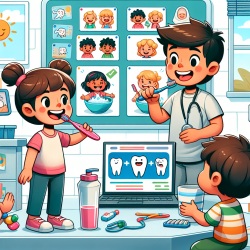In the realm of speech-language pathology, data-driven decisions and evidence-based practices are pivotal for creating optimal outcomes for children. A recent study titled Distressing psychotic-like experiences, cognitive functioning and early developmental markers in clinically referred young people aged 8–18 years offers valuable insights that can significantly enhance the quality of online therapy services provided by TinyEYE. This blog will discuss how practitioners can leverage these findings to improve their skills and encourage further research.
Key Findings from the Research
The study investigated associations between psychotic-like experiences (PLEs), cognitive functioning, and early developmental markers in young people aged 8-18 years. The research was conducted in two parts:
- Study 1: Focused on children aged 8-14 years and examined receptive language, verbal learning, and developmental delays.
- Study 2: Focused on adolescents aged 12-18 years and tested associations with vocabulary, perceptual reasoning, word reading, and developmental delays.
The results revealed that children with distressing PLEs had lower receptive language skills and delayed recall, along with higher rates of developmental delays. In contrast, cognitive-developmental variables did not significantly predict PLE distress severity in adolescents.
Implications for Online Therapy
Based on these findings, practitioners can adopt several strategies to enhance online therapy for children:
1. Early Identification and Intervention
Identifying children with lower receptive language skills and developmental delays early can be crucial. Incorporating standardized assessments like the British Picture Vocabulary Scale (BPVS) and the Rey Auditory Verbal Learning Test (RAVLT) in initial evaluations can help in early identification.
2. Customized Cognitive Strategies
Developing tailored cognitive strategies that target specific deficits such as receptive language and delayed recall can be beneficial. These strategies can be integrated into cognitive-behavioral interventions to help children cope with distressing PLEs.
3. Parental Involvement
Engaging parents in the therapy process by educating them about developmental milestones and encouraging them to report any concerns can provide a comprehensive understanding of the child's needs.
4. Continuous Monitoring and Adaptation
Regularly monitoring the child's progress and adapting therapy plans based on ongoing assessments can ensure that interventions remain effective and relevant.
Encouraging Further Research
The study underscores the need for further research to identify which cognitive processes are most strongly implicated in PLE distress. Practitioners are encouraged to participate in and contribute to ongoing research efforts to refine and enhance therapeutic interventions.
To read the original research paper, please follow this link: Distressing psychotic-like experiences, cognitive functioning and early developmental markers in clinically referred young people aged 8–18 years.










